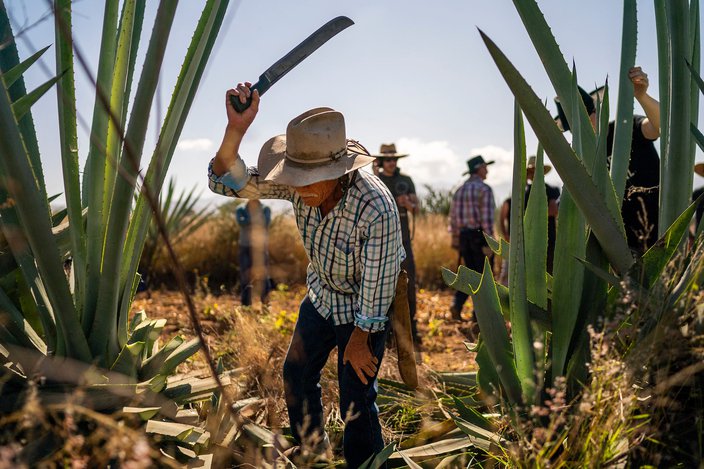Mezcal is a centuries-old spirit with roots in ancient Mexican culture. Agave, the succulent that is roasted and mashed to create mezcal, even had its own Aztec goddess; Mayahuel, in folklore, fed the plant’s sap to her 400 children, known as the Centzon Tōtōchtin, or “drunken bunnies.”
But mezcal has become a modern trend in the United States in recent years. In 2022, Americans spent more on tequila and mezcal than U.S. whiskey for the first time, and the combined beverage category is expected to surpass vodka this year as the country’s most-purchased spirit.
That means there’s a lot more people interested in mezcal, which David Suro Piñera explores at length in “Agave Spirits: The Past, Present and Future of Mezcals.” The owner of Tequilas Restaurant in Rittenhouse and founder of Siembra Spirits teamed up with ethnobotanist Gary Paul Nabhan on the book, which details the many complicated factors that go into producing a single bottle of the liquor.
It all starts with nature — namely, the agave, a tall green perennial known as a “century plant” for its long life. Though it normally doesn’t last 100 years, some agaves can make it to 80 before they bloom, signaling their impending deaths. They’re resilient plants, thriving in hot deserts on very little water.
Global warming, however, has been changing that. Agaves are now blooming faster, and dying faster, than they did in previous years, Suro Piñera said, and as persistent drought eliminates grasses, local cattle are grazing on the succulents more.
“You’ve got to remember agaves have been on the planet longer than humans have been,” Suro Piñera said. “And they’ve been perfectly fine until, you know, in a fraction of a millisecond in a historical context, we disrupted this very harmonious and beautiful balance in Mother Nature.”
He described mezcal as a uniquely “agriculturally driven” alcohol category, which requires not just land and water but time. Since agaves take many years to grow, the production process for mezcal is a lengthy one that cannot officially begin until the plant’s enormous “heart,” known as the piña, is harvested. The piña is then roasted in an oven, mashed into a pulp and mixed with water and yeast to ferment. Once it’s transformed into alcohol, the liquid is typically distilled at least twice before bottling.
 Antranik Tavitian/The Republic via USA TODAY NETWORK
Antranik Tavitian/The Republic via USA TODAY NETWORK
Agave plants can grow six feet tall. In this December 2021 photo, a master mezcalero cuts agave plants growing in Oaxaca, Mexico.
“Whatever we’re doing in mezcal right now, (we should have been) planning at least eight years ago, and in some cases of agave species, 25, 30 years,” Suro Piñera said. “So, yeah, it is concerning. The popularity has become a real challenge for the category as far as sustainability.”
Mezcal’s natural pollinators are also feeling the effects of its booming popularity. Migrating bats traditionally feast on agave nectar and spread the plant’s pollen, because both species are active at night. (The plant’s reproduction occurs in the nighttime.) But in the rush to get more mezcal into production, many farmers are cutting the agave before it fully matures, disrupting the plant’s reproduction and depriving bats of their midnight snacks.
Suro Piñera, through his Tequila Interchange Project, has rallied for a “bat-friendly” tequila and mezcal movement to address the issue. Growers are considered bat-friendly if they let 5% of their agaves flower, though there is no official certification process. The program was developed with ecologist Rodrigo Medellín, a leading voice in conservation known as the “Bat Man of Mexico.”
“He’s very concerned about bats, and I’m very concerned about agave,” Suro Piñera said. “The idea of bringing back the food for the bats came through the necessity of genetic strength to be able to obtain more plants that are healthier, and able to survive in their ecosystems, and defend themselves from their natural predators, diseases. They need to have that genetic strength in order to do that.”
The picture might seem bleak, but Suro Piñera doesn’t think mezcal is doomed. In “Agave Spirits,” he and Nabhan outline a 10-point action plan to “set the agave spirits industry and its many stakeholders on a healthier, more sustainable course.” The detailed proposal calls for reforesting efforts, allowing a set number of agaves to bloom for bats, a 3.1-mile buffer between wild populations of agave and new plantings and the withdrawal of permits to harvest in areas where threatened wild species grow.
The plan also focuses on the workers who harvest these crops, who often do not own the land they farm and live in poverty. Suro Piñera and Nabhan believe collective trademarks should be established for local and indigenous producers and government-funded health care benefits should be extended to all distillers, harvesters and daily wage workers. Rural health clinics are also needed to test and treat them for dehydration and exposure to pesticides, they say.
As for the mezcal scene in Philadelphia, people normally can sample many at Suro Piñera’s restaurant, which opened in 1986 at 1602 Locust St. But Tequilas closed in February due to a fire and has yet to announce a reopening date.
While Suro Piñera could not provide any updates on the timeline, he promises a new and better Tequilas, as soon as possible.
“One of the positive things about this challenge is that we have time to rethink about the future of Tequilas,” he said. “We are going to open with interesting alternatives. Besides the old classic Tequilas, we’re going to introduce new, fun, 21st century Mexican food.”
Follow Kristin & PhillyVoice on Twitter: @kristin_hunt
| @thePhillyVoice
Like us on Facebook: PhillyVoice
Have a news tip? Let us know.



